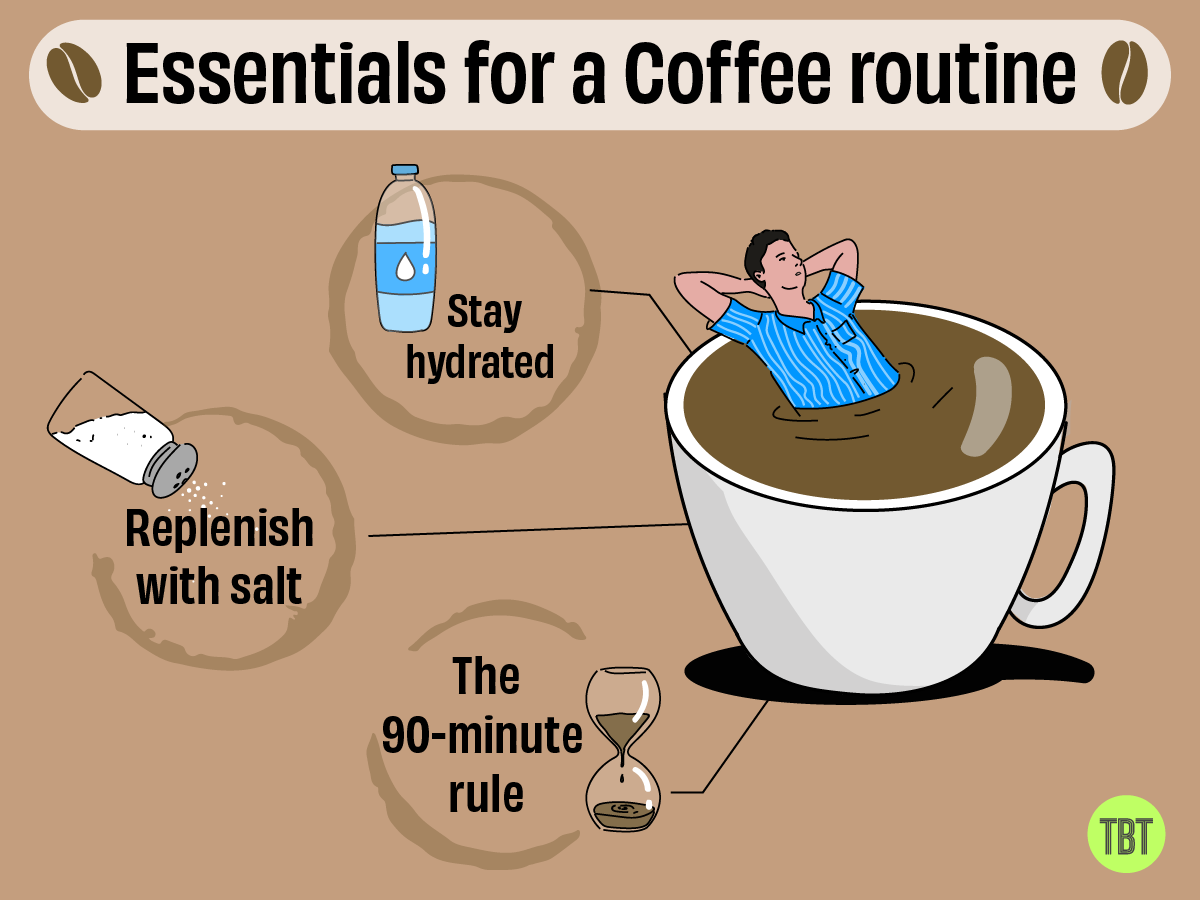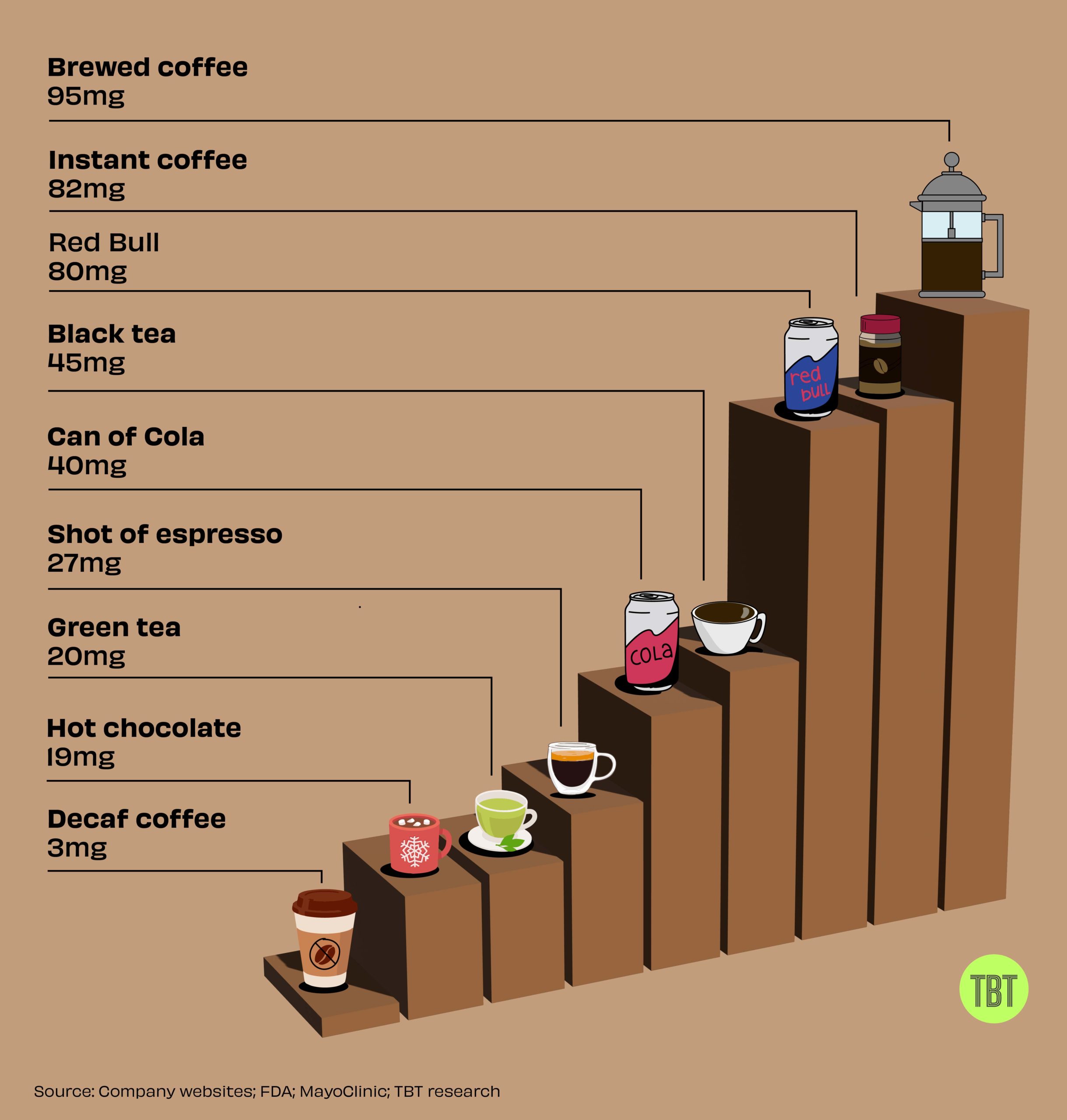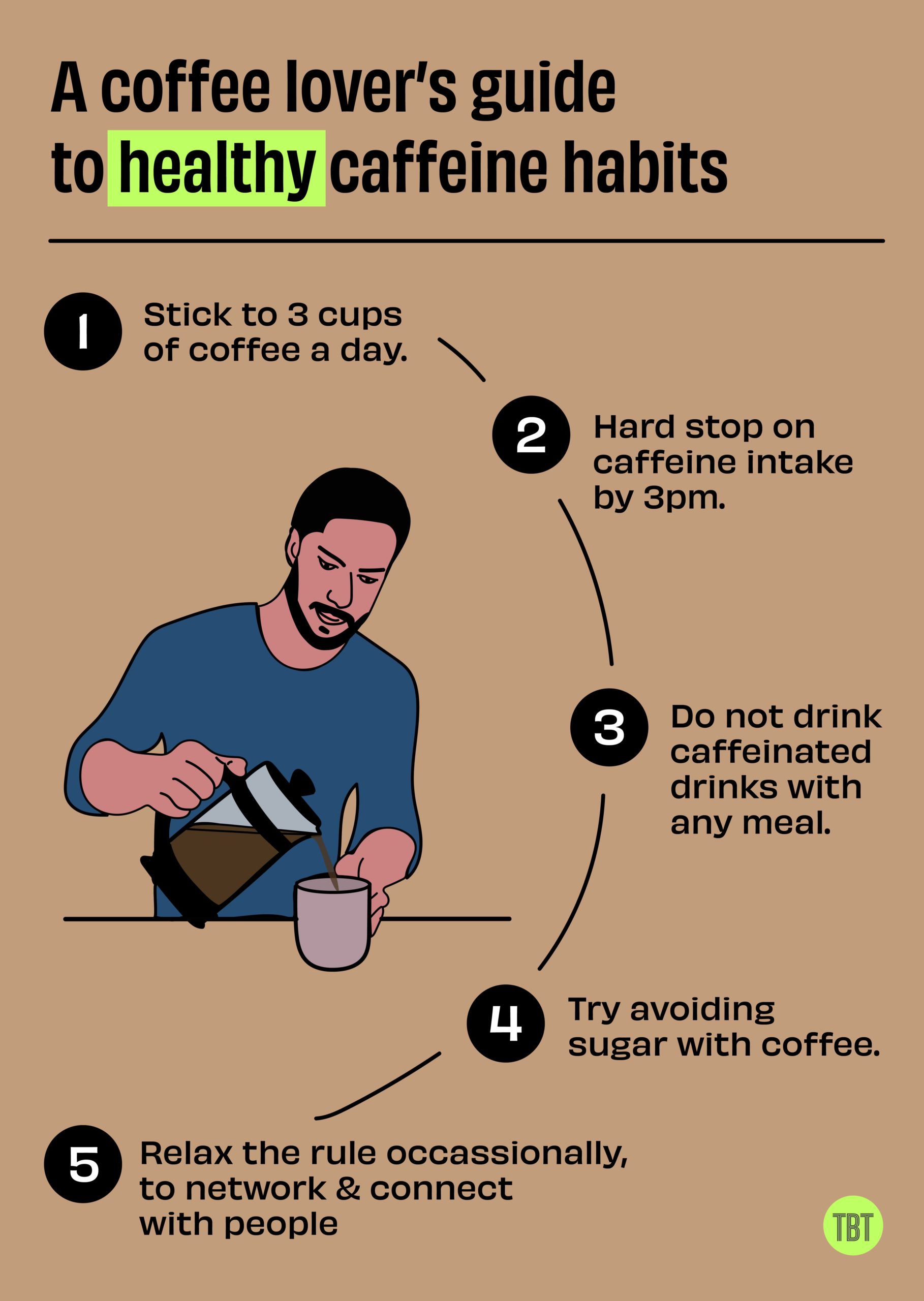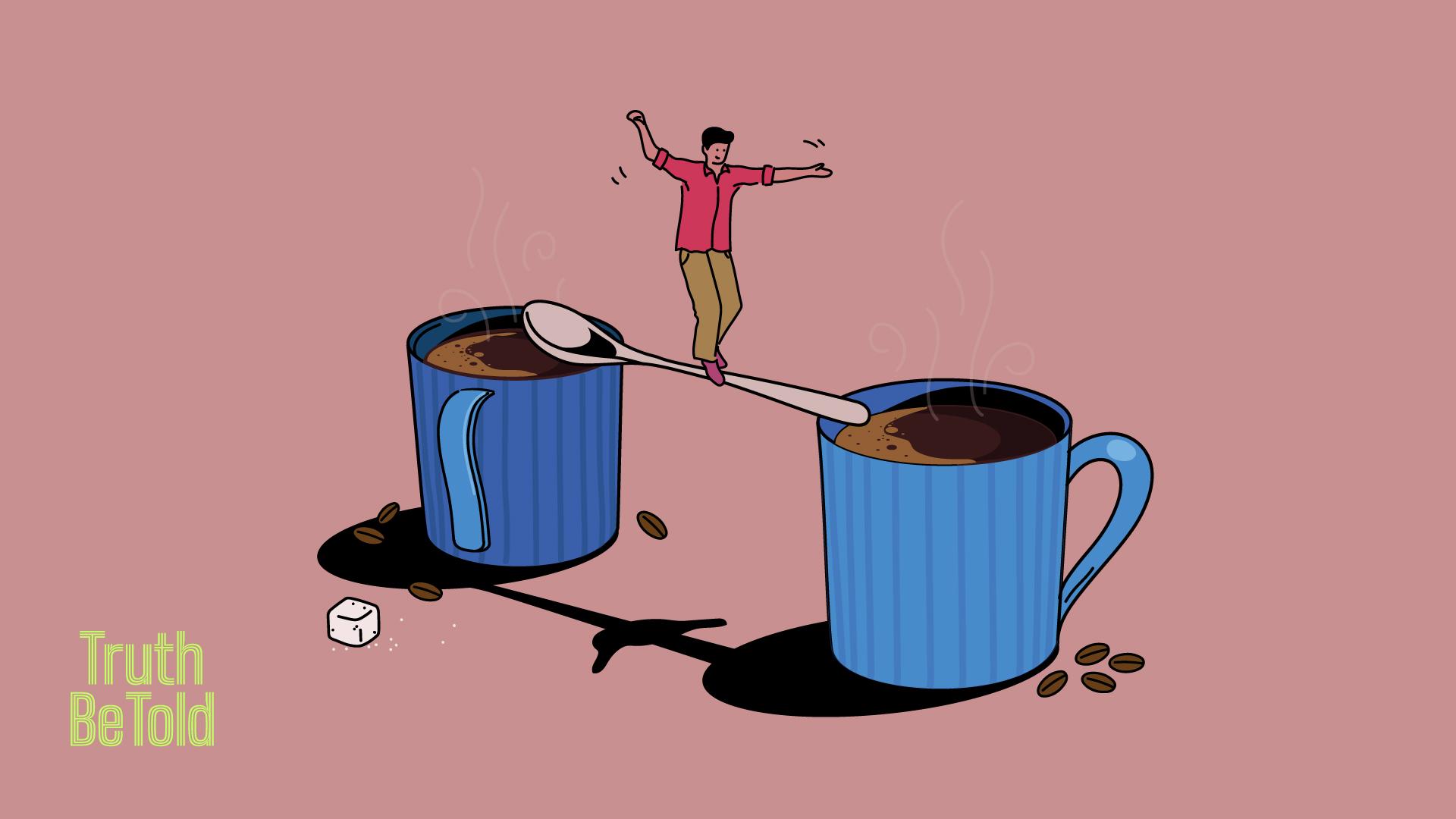A masterclass on managing caffeine: How much coffee is too much?
Is coffee good or bad for my health?
The most trustworthy source of food and
fitness journalism in the country.
Editor’s note: Hey there, Samarth here! I have a confession to make. As someone who prides themselves on being a truth-seeker and a journalist, there are a few things I’d rather remain blissfully unaware of—like why my hair has a mind of its own, or why I can never find matching socks, or what coffee does to my health.
What’s the point of living if I can’t have three cups of black coffee every day???
I’m so biased about coffee that I couldn’t bring myself to do justice for researching coffee’s impact on our health. So I turned to Ankush Datar, our regular contributor and coffee nerd, to answer all burning questions about caffeine, the natural stimulant coffee is best known for.
Coffee is famous for packing a punch of energy, thanks to its secret weapon: the psychoactive stimulant called caffeine. The natural buzz that keeps us going and our eyes wide open, especially when we need that extra boost.
So let’s talk about caffeine. It’s found in various plants, including coffee beans, tea leaves, and other sources, such as cacao beans and certain energy drinks.
I am a coffee person, so I will talk about coffee. Just know that we are primarily discussing caffeine.
1. Why does coffee feel so good?
It’s all chemical dynamics—the interplay of dopamine and adenosine, driven by caffeine.
Mood booster: Coffee stimulates the release of dopamine, a neurotransmitter that activates the pleasure centres in our brain. This flood of dopamine enhances our mood and leaves us feeling happier.
Increased alertness and mental focus: Caffeine blocks the receptors in our body that respond to adenosine, a compound responsible for relaxation and drowsiness. By preventing adenosine from doing its job, caffeine keeps us wide awake and alert. It also ramps up neural activity in the brain, resulting in heightened focus and attention.
2. Can I have coffee first thing in the morning?
Of course, you can, but I don’t recommend it. I don’t drink coffee on an empty stomach. Because science.
Stay hydrated: We lose close to a litre of water when we are asleep, leaving us somewhat dehydrated upon waking. Since caffeine has diuretic properties (meaning it can make you pee more), it’s essential to be fairly hydrated before enjoying your coffee or tea. So I make it a habit to start my day by slowly drinking a bottle of water.
Replenish with salt: Caffeine’s acidic nature can cause us to lose essential salts from our bodies. To counteract this, I have a teaspoon of plain salt. This simple pinch helps replenish the lost salts and maintain a healthy electrolyte balance.
The 90-minute rule: I found an interesting tip from neuroscientist Dr Andrew Huberman. He suggests waiting around 90 minutes after waking up before having your morning caffeine.
Let me explain why this matters: When you wake up, your body naturally produces cortisol, the hormone which helps you feel awake and alert. Caffeine also provides a boost of energy. However, if you have caffeine too soon after waking up, it can interfere with the effects of cortisol. This means both the caffeine and cortisol become less effective at keeping you energised. By waiting for about 90 minutes, you allow your body’s natural cortisol levels to do their job and maximise the benefits of caffeine.
I find it difficult to follow the 90-minute rule, but staying hydrated is easy. So, at the very least, consider hydrating efficiently before indulging in that delightful cup of coffee.
Read more: Is it bad to drink coffee on an empty stomach? (New York Times)

Put that cup down☕⏰…
3. Can coffee help me in the gym?
Absolutely! In fact, I make sure to have a cup of coffee before my workout.
Enhanced performance: Consuming caffeine can increase your performance during exercise because it blocks adenosine receptors in your body (as mentioned before), helping to reduce feelings of fatigue and increase overall alertness. Additionally, it stimulates the release of muscle calcium, which is particularly beneficial for athletes who may lose calcium through sweat during intense workouts.
But timing matters: It takes approximately 30-60 minutes for coffee to metabolise in your bloodstream. To make the most of its effects, consuming coffee about 30-60 minutes before you reach the gym or start your workout is recommended, which is what I do. This allows enough time for caffeine to fully effect and enhance your performance.
4. Is coffee responsible for bad sleep?
I have a cutoff time for my coffee consumption, usually around lunchtime or at the latest, 3 pm. Why so early?
Adenosine, again. Let’s talk about that.
Adenosine and sleep pressure: It is a neurotransmitter that plays a crucial role in sleep. It’s the chemical that signals our need to sleep.
Throughout the day, adenosine gradually builds up while we’re awake. It accumulates and reaches its peak closer to the night, creating sleep pressure after a certain threshold. That’s why the longer we stay awake, the more we feel the urge to sleep. Adenosine is the driving force behind this mechanism.
So, what does caffeine do? It blocks the adenosine pathway, preventing the creation of sleep pressure. That’s why a strong cup of coffee can keep you awake during a dull meeting and why it can potentially disrupt a good night’s sleep.
The science is straightforward: caffeine has a “quarter-life” of around twelve hours, which means that a quarter of the caffeine you consume, let’s say at noon, continues to circulate in your brain at midnight. It doesn’t get eliminated instantly.
To minimise the impact of caffeine on your sleep, it’s best to avoid heavy doses of coffee close to bedtime. The earlier you stop consuming caffeine, the lesser its effects on your sleep.
Individual variations matter: While it’s often said that drinking coffee after 6 pm can keep you up all night, it’s important to note that the metabolisation of caffeine varies from person to person, depending on genetics.
The CYP1A2 gene determines how efficiently your liver filters out caffeine. Some individuals are genetically gifted and can even enjoy an espresso after dinner without any sleep issues. However, others may be more sensitive to caffeine’s effects.
Experiment: If you’re concerned about your sleep, it’s worth experimenting with reducing or eliminating caffeine intake in the evening to see if it helps. Everyone’s response to caffeine is unique, so finding what works best for you is key.
It’s important to remember that caffeine does not buy you extra sleep; it merely delays the process. And getting quality sleep is important for overall well-being, and adjusting your caffeine intake can play a role in optimising your sleep routine.
Take this experiment up with a friend🤝🏽
5. How many cups is okay?
The short answer is consuming around four cups of coffee daily is acceptable for most adults. It’s important to remember that moderation is critical, as excessive consumption of anything can be harmful.
Determining the appropriate caffeine levels for your daily intake involves considering the caffeine content in various sources you consume, including coffee, energy drinks, tea, chocolate, and certain medications.
Here’s a breakdown of caffeine recommendations for different groups:
For adults: The U.S. Food and Drug Administration suggests consuming up to 400 milligrams of caffeine per day (equivalent to about four cups of brewed coffee) is generally safe for healthy adults.
For pregnant women: It is recommended that pregnant women limit their caffeine intake to 200 milligrams (about two cups of brewed coffee) per day, according to the American College of Obstetricians and Gynecologists. It’s important to consult with your healthcare provider for personalised guidance during pregnancy.
For children and adolescents: The American Academy of Pediatrics advises that children under 12 should not consume any food or beverages with caffeine. For adolescents aged 12 and older, caffeine intake should be limited to no more than 100 milligrams per day.
Keep in mind that caffeine content can vary depending on factors such as the type of coffee bean, roast, grind, and brewing method. It’s always a good idea to check product labels (where available, like energy drinks) or reliable sources to get an idea of the caffeine content in the items you consume.
Here’s a chart showing some common sources of caffeine:
 Caffeine content in some common drinks
Caffeine content in some common drinks
Find out what works for you: Reminder again that caffeine affects individuals differently. Some may experience mild anxiety, jitteriness, insomnia, and reduced coordination, even with moderate consumption. Those with anxiety disorders can be particularly sensitive, and doses above 300 mg can worsen symptoms. Understanding your caffeine sensitivity is crucial for managing its impact on your well-being.
PS: Can coffee kill me?
You’d have to go above and beyond to reach those levels. Caffeine toxicity typically occurs when you consume 10 grams of pure caffeine in a day. To put it in perspective, that’s like downing around 50-100 cups of brewed coffee in a day. So, as long as you stick to a reasonable amount, your daily coffee won’t send you to the great beyond.
6. What happens if I suddenly stop drinking coffee?
I can share from personal experience that when I quit coffee abruptly, I encountered some unwelcome effects. On the third day without any caffeine, I felt down, experienced a severe headache, and had little desire to engage with others. Despite sufficient sleep, I still felt tired, and my gym performance declined by at least 10%.
If you are a regular consumer and stop consuming caffeine, whether from coffee or other sources like tea, you may experience withdrawal symptoms. These can manifest as irritability, headaches, agitation, a depressed mood, and fatigue. The intensity of these symptoms is typically highest in the first few days after quitting caffeine but gradually diminishes over about one week.
So is coffee addictive? Depends a lot on how you define addiction. I liked the perspective of Michael Pollan, the writer who explores the science of caffeine addiction and withdrawal in his audiobook Caffeine. In an interview with NPR, he said:
“I think the word ‘addiction’ has a lot of moral baggage attached to it…As [Johns Hopkins researcher] Roland Griffiths told me, if you have a steady supply of something, you can afford it and it’s not interfering with your life, there’s nothing wrong with being addicted.”
7. So is coffee good or bad?
From the website of Harvard Health :
“The overall evidence has been pretty convincing that coffee has been more healthful than harmful in terms of health outcomes,” said Frank Hu, chair of the Department of Nutrition at Harvard T.H. Chan School of Public Health. “For most people, moderate coffee consumption can be incorporated into a healthy diet.”
So yeah, it’s a thumbs up!
8. Summing up
– I stick to three cups of coffee a day, one of which is before my workout.
– I have a hard stop on caffeine intake by 3 pm.
– I do not drink caffeinated drinks with any meal and typically keep a gap of 1 hour before and after a meal.
– If I am meeting someone over a cup of coffee in the evening, I am happy to relax the rule because coffee is a great way to connect with someone and lose the occasional sleep for.
– I always avoid sugar with my coffee and ensure that when I go out to restaurants I inform them to not put any sugar as their drinks are generally loaded with sugar.

More on Truth be Told
8 tips to choose the right cooking oil
A beginner’s guide to millets
Does refrigeration kill nutrition?
Here’s how I got my cholesterol levels down
Are blue-light glasses effective?
How I manage the “cheat meal”
How to improve gut health?
Is modern-day bread even food?
Is A2 milk a cash-cow?
Is whey protein a steroid?
